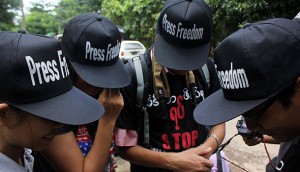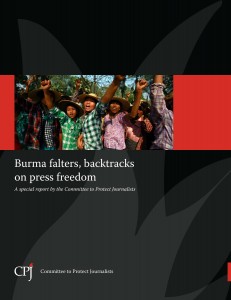Posts Tagged ‘Media Freedom’ (32 found)
Call for Probe Into Military Junta’s Crimes Against the Media
Reporters Without Borders has written an open letter to Burmese President Thein Sein, who begins a two-day visit to France tomorrow, calling for an investigation into the former military government’s crimes against the media since 1962 […]
• • •BNI Opposed to New Media Law
Burma News International, which consists of various ethnics media groups, opposes the new media law submitted by the Ministry of Information to the People’s Parliament.
“Printers and Publishers Registration Law has allowed the Ministry of Information to control the freedom of media agencies. This can be damaged the right to freedom of the press.” BNI development officer Nan Paw Gay said […]
• • •Upper House Must Not Approve Proposed Media Law in Its Current Form
Reporters Without Borders regrets the proposed Printing and Publishing Enterprise Law’s adoption by the lower house of parliament (Pyithu Hluttaw) on 4 July as it runs counter to all the interim Press Council’s recommendations and has been widely criticized by the Burmese media.
“We fully support those journalists who are calling for this repressive bill to be abandoned,” Reporters Without Borders said. “The upper house must reject this proposed law in its present form as it does not meet international standards on protection of the media […]
• • •Upper House of Parliament Must Reject the Printing and Publishing Enterprise Law
 On 4 July, the Lower House of Parliament approved the controversial Printing and Publishing Enterprise Law despite strong opposition and criticism by the interim Myanmar Press Council, local media and freedom of expression watchdogs.
On 4 July, the Lower House of Parliament approved the controversial Printing and Publishing Enterprise Law despite strong opposition and criticism by the interim Myanmar Press Council, local media and freedom of expression watchdogs.
The Ministry of Information introduced the draft law in Parliament last March, a week after the Press Council released its own draft Media Law. This came as a surprise as the Ministry’s draft was written in secrecy, presented to the Parliament before any consultation took place and happened despite an earlier agreement that the Press Council would be in charge of drafting the new media legislation.
As a reaction to this clear attempt by the Ministry to bar the Council’s legislation from being presented to the Parliament, local and international media loudly opposed the Printing and Publishing Enterprise Law. The Committee to Protect Journalists said, “If passed in its current form, the draft law will essentially replace Burma’s old censorship regime with a similarly repressive new one.” Article 19 called for the draft law to be withdrawn or rejected by the Parliament “as it would be a major step backwards for freedom of expression and freedom of the media, restoring prior censorship and full governmental control over the press” […]
• • •Myanmar: Public Service Media Needed but Proposed Bill Inadequate
Establishing a genuine public service media is desperately needed in Myanmar to provide an independent, impartial and balanced source of information, and to encourage pluralism. Unfortunately, the proposed bill on public service media would if adopted continue state control of the media and the disenfranchisement of ethnic minorities. ARTICLE 19 urges parliament to make significant changes before adopting it […]
• • •Burma Falters, Backtracks on Press Freedom
 The media landscape in Burma is more open than ever, as President Thein Sein releases imprisoned journalists and abolishes the former censorship regime. But many threats and obstacles to truly unfettered reporting remain, including restrictive laws held over from the previous military regime. The wider government’s commitment to a more open reporting environment is in doubt […]
The media landscape in Burma is more open than ever, as President Thein Sein releases imprisoned journalists and abolishes the former censorship regime. But many threats and obstacles to truly unfettered reporting remain, including restrictive laws held over from the previous military regime. The wider government’s commitment to a more open reporting environment is in doubt […]
Advances and Challenges to Media Freedom in Burma
 World Press Freedom Day was held on 3 May, marking an eventful year for media freedom and freedom of expression in Burma. There have been both advances towards increased freedoms, but also serious challenges.
World Press Freedom Day was held on 3 May, marking an eventful year for media freedom and freedom of expression in Burma. There have been both advances towards increased freedoms, but also serious challenges.
Most notably, the government ended pre-publication censorship and the disbanded the censorship board, the Press Scrutiny and Registration Division (PSRD). Independent organizations such as the Myanmar Journalist Association, Myanmar Journalist Network and Myanmar Journalist Union, have been permitted to form in order to promote the rights and welfare of journalists, replacing the government affiliated Myanmar Writers and Journalists Association. The Ministry of Information and Communications granted permission for 16 privately owned journals to publish dailies for the first time in 50 years starting on 1 April, with an additional 10 journals granted permission at the end of April. Many exiled journalists have returned to Burma and foreign news agencies, such as Associated Press, NHK and Kyodo News, are opening offices in Rangoon.
Despite these positive steps, there remain many challenges to the freedom of expression of journalists and publications. One of the largest threats of repression is that the Printers and Publishers Registration Act (1962) and other restrictive laws remain on the books, providing legal grounds for the government to repress critical voices […]
Gains Need Consolidation in Landmark Year for Change in Burma
This report summarizes the current state of press freedom and freedom of expression in Burma, as a part of SEAPA’s report “Southeast Asia Press Freedom Challenges for 2013.” It examines the expanding space for media in the country, increasing journalist solidarity and the turbulent transition that still lays ahead, especially when it comes to divisive issues such as violence against Muslims. In summary, the reforms have not yet been institutionalized and the government still seems bent to retain control of the press and right to freedom of opinion and expression […]
• • •Retrograde Bill Threatens Tentative Progress
Although eight privately-owned dailies are to be launched on 1 April in a development that is without precedent in the past 40 years, Reporters Without Borders is very concerned about a proposed new law on printing and publishing that was submitted to parliament on 4 March […]
• • •Draft Media Law a Step Backward for Burma
Draft legislation designed to govern the media in Burma threatens to reverse fragile press freedom gains recently achieved under President Thein Sein’s democratic reform program, the Committee to Protect Journalists said today […]
• • •








 All posts
All posts